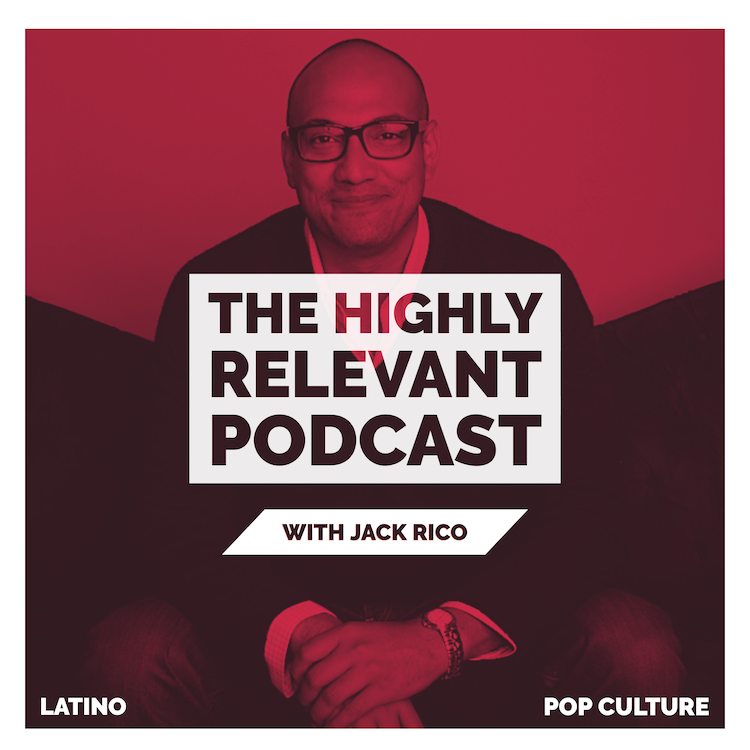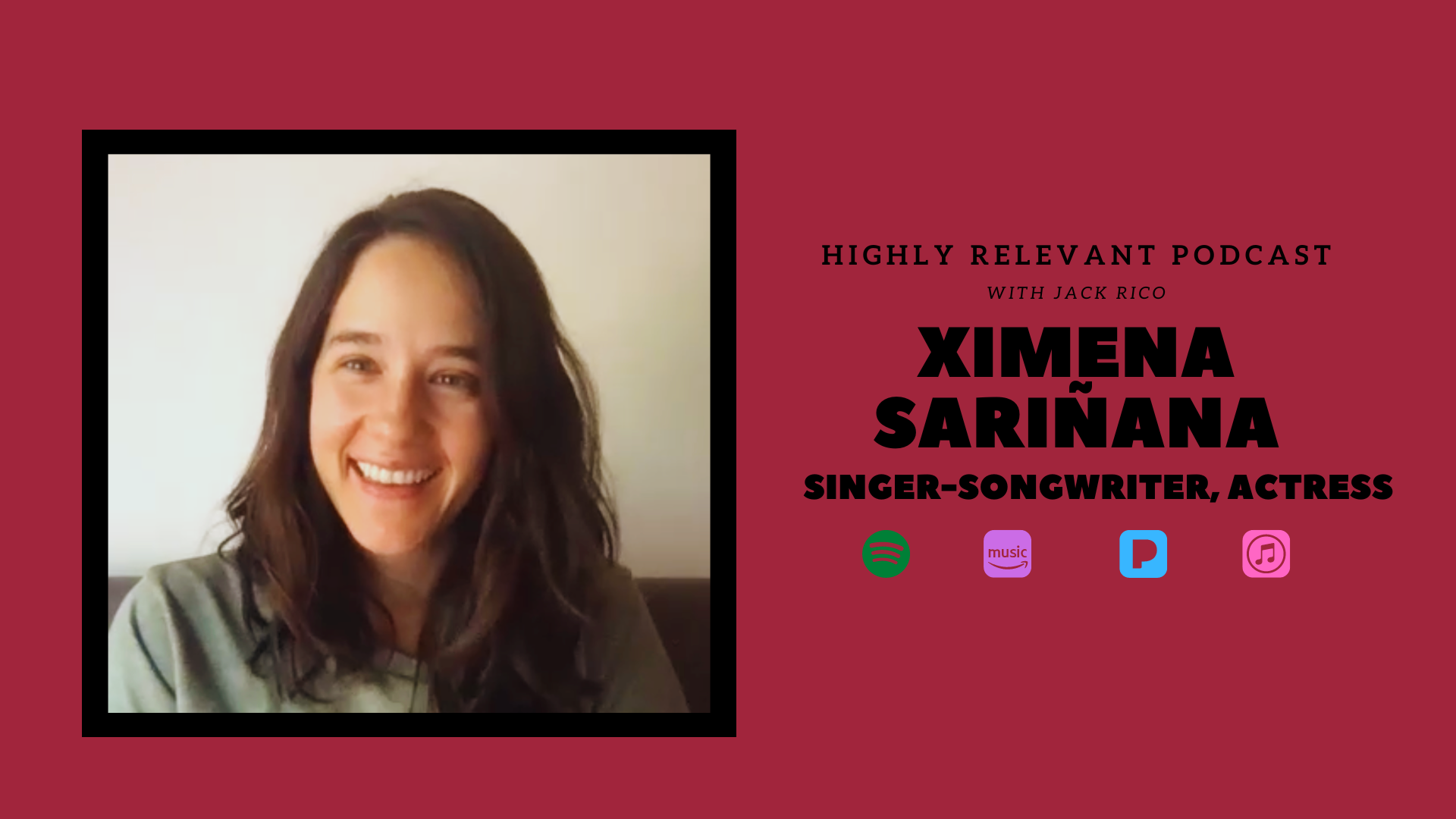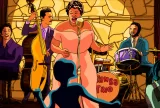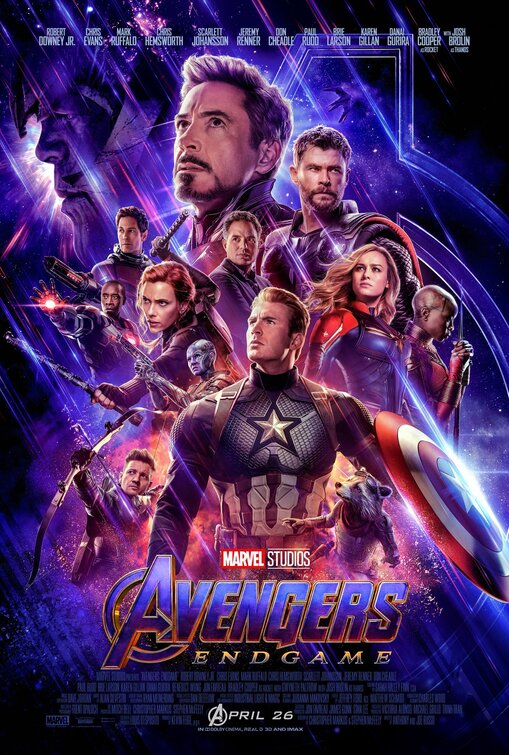News Headlines
The Top 3 Latino Films of 2023
01.5.2024My Top Films of 2022 on PIX 11 News
12.20.2022West Side Story (Movie Review)
12.2.202110.3.2022 | By Jack Rico |
If you aren’t familiar with Ximena Sariñana, she’s one of Mexico’s most talented musicians and actresses. In this latest podcast episode of Highly Relevant with Jack Rico, we discuss her most recent album Amor Adolecente and how her hit ballad ‘Una Vez Más‘ came to be. We also discuss the significance of her sophomore English-language album in her artistic growth, the pressures for Latin artists to succumb to the Reggaeton momentum, why it’s hard for Latina artists to find global acceptance, and we discuss her dreams of one day composing on the NY Broadway stage. Listen to the podcast or read the transcript of the interview below.
Highly Relevant Podcast Interview with Ximena Sariñana
Jack Rico: So I know you’re a singer-songwriter and actress. You’ve released five studio albums, received dozens of awards, and nominations, including the Grammys, Latin Grammys, MTV Awards, and acted in dozens of films and television shows. When did you first become aware that you were good enough to be a singer, to be able to make and earn a living off of it and not embarrass yourself?
Ximena Sariñana: That’s a good question, but probably when I was in school and stuff, I was always the girl that they picked to sing, the lead voice in the Christmas carols, concerts in elementary school, that sort of thing, but I guess it was when I was a teenager, started to sing in my friends’ bands and like punk rock bands and that kind of thing. I was like, hey, I think, I sound good and I sing pretty much in tune. So I went into music school at around like 15 and then I went for a five-week program around that time and ended up being able to get a spot in like the most coveted ensembles and perform, and kind of have other musicians aside from my childhood friends say, ‘Hey, this girl’s pretty good’. And then I started writing my own songs, and I was in a movie named “Amar Te Duele” which was really big in Mexico, and I ended up writing like three or four songs for that soundtrack.
I think that’s when people really started to notice me and actually looked at the possibility of me having a music career. That was when I was like, okay, maybe I have a shot at this. And I started taking my singing a lot more seriously and started to really think about what I wanted my first album to sound like and what kind of artist I wanted to be.
Jack: I wanted to ask you about ¿Dónde Bailarán Las Niñas? When you created that album, did you know how good that album was and that it could be one of your better albums?
Ximena: You’re never gonna put out something that you’re not completely able to stand by, to stand for, to defend, because in the end, it’s your music and anything you put out, you’re gonna have to defend over and over and perform over and over. So it better be something that you are absolutely in love with, that’s definitely where I take all my albums before I’m gonna put them out. Once I’ve taken them there and I’m like, okay, I think this is the best album, a level where I’m comfortable with and that, I’m gonna be able to talk about and I’m gonna be able to perform it over and over.
Then I put it out and then what happens afterward is how people perceive the album. You chuck it up to luck and you have to be comfortable with the possibility of what you wanna say with the album. You’re always gonna have the satisfaction of knowing that it’s good music, knowing that you’re proud of it, that you learned from it, that you worked on it, tirelessly and endlessly. And that the thing that you had in your head and the concept that you wanted to convey or to portray, that’s something that you achieved and the rest is not up to you.
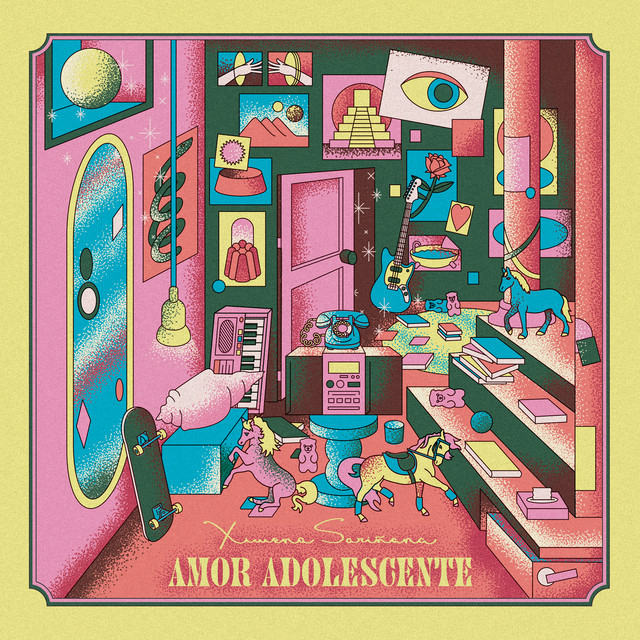
Jack: So we now jump fast forward to your fifth studio album ‘Amor Adolescente’. What was the inspiration for this album and how does it differ from ¿Dónde Bailarán Las Niñas?
Ximena: This is like a completely pandemic album, at least the process of actually putting it into the studio is definitely pandemic. I mean, we did it in June 2020, it was just very few people in the studio. But it was also nice because there was kind of like this apocalyptical sense of the world, so we weren’t really paying attention to anything but our intuition. And it was kind of psychedelic in a way. I don’t know. When I think about it, I think about the songs and how each and every one of the songs tells its own story. And I wasn’t even thinking about piecing them together. I wasn’t thinking about the genres that I was experimenting with. It was just like, ‘Hey, you know what? Let’s have fun.’ We’re so blessed that we’re able to be here in a studio, for amazing musicians who are also like my best friends. And that I can be here in the middle of nowhere, in the middle of the forest when the whole world is like, completely going crazy. It’s like we’re just so privileged that we’re able to be doing this, and we’re just enjoying every single moment of the process. And, being really grateful every single day that we were able to just be in the studio together, making music.
So in that way, we weren’t thinking about anything else. I wasn’t thinking about it being a follow-up. All I was thinking about was, okay, this is a concept, it’s a celebration of love in every single one of its stories and every single one of its forms. It’s a tribute to the music that I listened to when I was an adolescent when I was a teenager. Albums like Miseducation of Lauren Hill with all those interludes that Lauren Hill did in that album. And it was really having fun with it and just enjoying all the tools that you have as a person and as a musician.
Jack: Tell me the story of ‘Una Vez Más’.
Ximena: Well, Una Vez Más, is a really special song because I wrote this in a song camp that they organized for women, for women composers, women singer-songwriters, or women writers. And it was me and three more women in the studio writing this song.
And since the beginning, I told them what I wanted to write about. I was like, okay, I want this song to be for my project, and you hear all these songs about new love or about heartbreak or in that time and space of a relationship. But you hear very little songs about picking the right person over and over after many years together. Like a positive love song of an old love, a love that’s been through a lot of ups and downs or a lot of things. And still like waking up next to that person every single day for the next 20 or 30 years and being like, I choose you once again.
There were a lot of great songs that were written in that period of two days. But when people would listen, when the other girls in the other rooms listened to this song, everybody would immediately cry. It was so funny because I wasn’t able to stay that day where everybody listened to everybody else’s songs. And the next morning I had five different messages from friends of mine that had gone and listened to the songs that were written and being like, ‘Oh my god, you have no idea!’. We heard that song and I immediately started crying. Like all these different artists from different backgrounds and different genres being like, ‘This song is so moving, it’s just so beautiful’. And when you can achieve that with a terrible demo, with a terrible guitar playing, and when the song is still so new that you’re not able to really perform it, well, when you achieve that at that point, then you know you have something really special. And you just have to make sure that you don’t mess it up.
Jack: You talked about experimenting with musical genres. One genre that I have not heard you experiment with is Reggaeton.
Ximena: Juanes is a really good example because he was a huge influence for ¿Dónde Bailarán Las Niñas? because I think both me and him worked with the same people for those albums and they were all people that were from the Reggaeton world. It’s funny that you mentioned that because for me, ¿Dónde Bailarán Las Niñas?, that whole album, was me experimenting with Reggaeton and with Dembow, but of course, it’s never gonna sound like a Reggaeton album. That just talks about the kind of artists that we are. Both Juanes and me know that in the end, you cannot take away your stamp from the genre that you’re experimenting with. Even with Cumbia, I mean we did Mr. Carisma which is our take on Colombian cumbia, but still, it’s my interpretation, and there’s still strange harmonic changes and there’s just the vibe of my voice like it’s still gonna sound like me.
Jack: Has there ever been any pressure from the record label, even from yourself, to perform Reggaeton in order to generate profit?
Ximena: I’ve been in the industry and I’ve been an assigned artist for more than 15 years, so, I’m kind of used to the pressure at different times and it’s been different every single time, so at first it was pressure to be a little bit more pop sounding, right? Then the pressure was maybe to do more features with Anglo artists. Then the pressure was, ‘you can’t release that much music’ or like, ‘collaborate with that many different artists’. And then that changed to, ‘you have to do features with pretty much everyone that you know’. And then you kind of can’t take it too personal or too serious. Because everything is just changing so quickly and it’s gonna change. I mean, I don’t think I think I love Reggaeton. Don’t get me wrong.
I admire Bad Bunny as an artist. I think Bad Bunny is great at what he does and I think we musicians and us artists like we’re not very divisive in terms of genre. If you’re a true musician and a true artist, you can appreciate all kinds of musical genres. And in every musical genre, there’s people that do it amazingly and people that do it terribly. Reggaeton in the end is not gonna be the number one genre forever. I think you just have to be true to what rings true to you. I love experimenting, but I’m not going to change the kind of artist that I am because right now this is the trend, you know what I mean?
Jack: 2011, you put out a self-titled album fully in English. Out of the 12 tracks, 11 of them were English. Were you trying to prove a point cuz? What was the mindset when you flipped into an English language album and were you happy with the results?
Ximena: I’m very happy with how that album turned out because it allowed me to think of myself as an artist, as a global artist. And that’s very difficult for a Latina artist to break that glass ceiling. Because as a Mexican teenager growing up being a global artist was kind of unreachable. I mean, the only Latin artists that you were doing globally was Shakira and Ricky Martin, and pretty much that was it, And I was like, my music is nothing like Shakira and my music is nothing like Ricky Martin. That’s not the kind of music that I do or the kind of artist that I wanna be. Like I’m not a full-on pop artist, like, that’s not the kind of music that I’m doing. For me to suddenly be considered in the same wavelength, at least for the record label speaking in record label terms as the artist that I grew up listening to, like Regina Specter or Fiona Apple, for me was like, somebody pinch me, you know what I mean? This is not really happening. It can’t be that I’m in the actual same record label as Regina Specter.
And I’m gonna go through the same processes that she goes through, and I’m gonna have the same A&R like for me that was just a dream and I’m gonna be working with the producers that everybody is working with. And for me, that was an experience that I was not going to pass on, especially at 23, 24. I’m still learning, I’m still a kid. I was not going to pass on the opportunity to be able to work with those producers and in that world, the Anglo world, with those artists and those producers and those writers and those budgets and just everything.
It was just… I saw the door open and I was like, I’m gonna go through it and I don’t care about what the consequences are gonna be, and I don’t care what people are gonna think and I don’t care what my managers are gonna say. I was just like, I’m gonna go for it. And I’m so glad that I did because now I think about it and like, I would’ve never been able to work with somebody like Gregory Kurstin nowadays. Like Greg produced most of that album and now he’s working with Adele and Paul McCartney. And these are like the biggest artists there are. I know Greg at some point when we were working together, he was like, ‘You’re one of the best artists that I’ve worked with so far’. That meant a lot. And that’s something that I don’t take lightly at some point he said that to me. So yeah, I’m really proud of my story.
I learned so much because I think that in the US market in general, there’s just so many talented people just because it’s like the epicenter of music. Like once people make it in the US, they’re pretty much able to travel all over the world with their music. There’s people from all over the world trying to make it that the bar is super, super high. People are so ridiculously talented and multi-instrumentalists and multifaceted and, they’re able to do so many things and it’s just so impressive, and you’re really like, ‘Okay, you know what? I really need to get my stuff together’. So you prepare a lot and once you have a lot of resources, like you have to scale down a lot. When you are touring in the US, especially as an opener know, you’re like, I have $100 a day to make this work. I have to be able to do as much as I can on my own. So once you get more resources, you’re like, ‘Okay, like what I can do with this whole amount of people or money or whatever’. You appreciate it way more. And I think it definitely made me grow up so much as an artist and made me appreciate every single person on my team. And it made me be a lot more dedicated to where I wanted to go and just a better musician overall.
Jack: As a bilingual artist, what do you prefer – a Grammy or a Latin Grammy?
Ximena: Honestly, neither. I mean it feels amazing to win an award. It really does. Like I haven’t won that many in my life. But when I did win my first award as a musician or as an actress, it felt amazing. It’s because it’s basically your peers being like, ‘You did a great job’. It feels really good to hear that, but historically, when you think Britney Spears probably has won a Grammy and then Led Zeppelin never won a Grammy. You’re like, I don’t understand, something’s wrong. I dunno if it’s wrong or right. It just happens to me all the time.
The artists or the albums that I’m mostly a fan of don’t necessarily get awards, don’t necessarily get millions of streams. They’re never in the top 50 best albums of the year lists and it doesn’t really mean anything. In the end, I think you really just have to make the music that you love to make and be grateful that you’re able to get money to make the music that you make and to, live comfortably and be happy. And, if you get awards or public recognition or millions of streams, great, but it’s not the reason why you make music and it’s not the reason why or, what really makes you happy.
And I really think that’s something that I’ve built and I’ve worked on a lot, to really just be happy with the process of making music because everything else is just so out of your control. Sometimes the albums that you think are gonna work the best, they just don’t get streams or don’t get nominated. Then sometimes you are surprised, sometimes you get nominated for things that you’re like, ‘Oh wow, really? They were paying attention’. That’s kinda what happened with Una Vez Más. We released that song and then suddenly we were nominated for Best Pop Song at the Latin Grammys, and I was like, ‘Wow, this makes no sense’. Like we had no idea that we were even being considered for that. So, wow. It’s really nice to just do your thing and be proud of what you do.
Jack: Now, I know you’re also an actress. You’ve been acting since you were a child. Are you as invested in acting as you are with your music nowadays?
Ximena: Well maybe if you would’ve asked me this three years ago, I would’ve said definitely no. But three years ago I started kind of like being, ‘You know what? I really do like acting and I wanna start, getting better at it’, I began to seek more opportunities, and this year I’ve done a couple of acting things that I was like, ‘Wow, I’m really proud of the work that I’m doing,’ and I’m really proud of myself that I even got a job as an actress because I don’t consider myself an actress anymore, I didn’t study it. I haven’t been doing it for a while. But this year I did a film and I’m doing a television series called Casa de Flores and the HBO Max show ‘Amsterdam’. Both presented really big challenges to me as an actress and I fought for the role. So I’m just like super proud of myself that I got the jobs and that I’m acting.
Jack: I know you’ve composed music for television shows. Has there ever been any interest to extend your musical composition skills to Broadway?
Ximena: Oh my God. I would love to. We talk about it all the time. I really like that about modern-day artists is that you’re pushed to be multi-talented, multi-hyphenated. It’s really cool. It’s really cool that I’m able to jump from one media to another and to be more creative in that sense and to think about our music in visual form and also, that maybe there’s like a story to it. And I’m really looking into making every project that I do now have a life on different platforms and it doesn’t need to only be a song. It can be a song and a video and maybe a story and maybe a live act. Like a 360 view is super interesting and super inspiring.
‘Highly Relevant with Jack Rico’ is a Latino pop culture podcast. Host Jack Rico, veteran bilingual TV host, journalist, film critic, and podcaster – talks with Hispanic actors, musicians, journalists, and media executives about how they are influencing mainstream entertainment.
For more conversations like this one, subscribe to ‘Highly Relevant:
Subscribe On: Apple Podcasts | Spotify | Google | Stitcher
Follow Jack On: YouTube | Instagram
